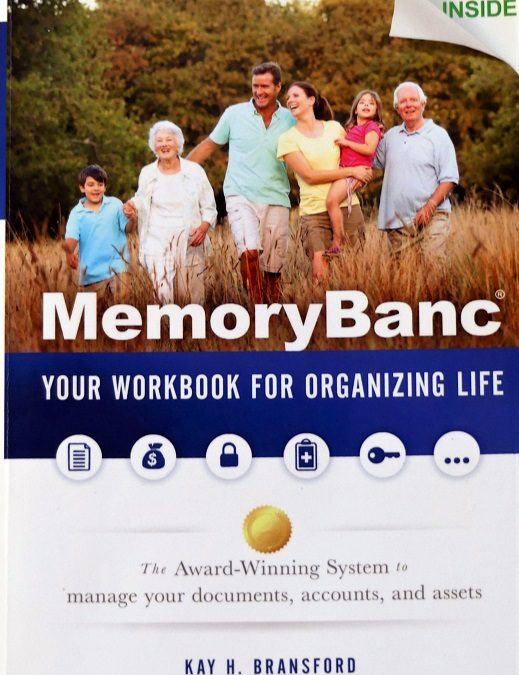If you were unexpectedly incapacitated, would your loved ones know which of your bills to pay? Would they know how to contact your accountant or insurance agent, or even know who they are? Would they be able to give your health insurance information to your medical providers? Be able to check your e-mail?
We all carry this information in our heads or have it stored somewhere in our homes, phones and computers. No one expects others to need this detail, but if you can’t act for yourself, your personal representative will need to have access. On the flip side, you may need someone else’s information to assist him.
This is a lot of information to gather and compile. How do you record it all? Exactly what information should you document?
One useful tool is MemoryBanc: Your Workbook for Organizing Life by Kay H. Bransford. MemoryBanc provides one place to record all your key personal information. Chronicling this information can be overwhelming. Bransford breaks it into manageable sections: personal, financial, online, medical, household, and “etcetera” (to include such information as birthdays and pet care).
While there are other record-keeping systems on the market, I like MemoryBanc for several reasons:
The workbook is available in three formats: a paperback book, a binder with dividers and loose leaf pages, and, for individuals who want a portable paperless system, a flash drive with editable PDFs. For security, Bransford recommends not storing your sensitive personal information in your computer unless your documents have very strong encryption. This, however, could make it difficult for your representative to access your data when they are needed.
The workbook can be used by individuals or couples as there are separate pages for each person’s information.
Emphasis is placed on the importance of recording online usernames and passwords for electronic accounts. It is easy to forget online access, including social media, shopping sites, and even your highway toll pass. Yet, we use these every day. Bransford writes, “Even mundane situations can arise that require you to know the basics of your accounts. For example, if your spouse or partner were unavailable, would you be able to make changes to your mobile account or request services for an item under warranty? Many of these accounts include PINs or security questions.”
The workbook can easily be handed over to loved ones should the information ever be needed to help them navigate your medical care and finances.
There is ample room to document information. The book edition has large spaces to record information which is important for people who have difficulty writing. Additionally, there are plenty of entries. There is space to enter 12 credit cards, for example.
The financial section is comprehensive. It includes income sources, bank and investment accounts, trusts and securities, retirement accounts, insurance policies, real-estate, loans, credit cards, and utilities.
Consider MemoryBanc not only for yourself, but for others for whom you are currently assisting or may assist in the future. And, while we may think chronicling this information is for “older” adults, don’t forget our youth. If something should happen to your twenty-year-old college student, for example, would you be able to access his bank or social media accounts?
We live in the Information Age. We have plenty of information relating to all aspects of our lives. The MemoryBanc workbook provides one comprehensive go-to place to store and locate your important information.
MemoryBanc: Your Workbook for Organizing Life by Kay H. Bransford in paperback lists for $19.95 and is available from book retailers. To order multiple copies of the book, the binder or flash drive, visit www.memorybanc.com.
This blog is published to provide you with general information only, and is not intended to provide specific or comprehensive advice. Money Care, LLC encourages individuals to seek advice from competent professionals when appropriate.
Photo by Robyn Young, Money Care, LLC

